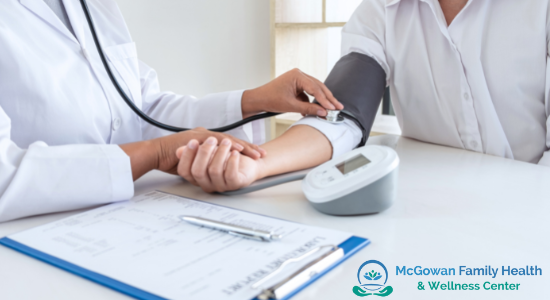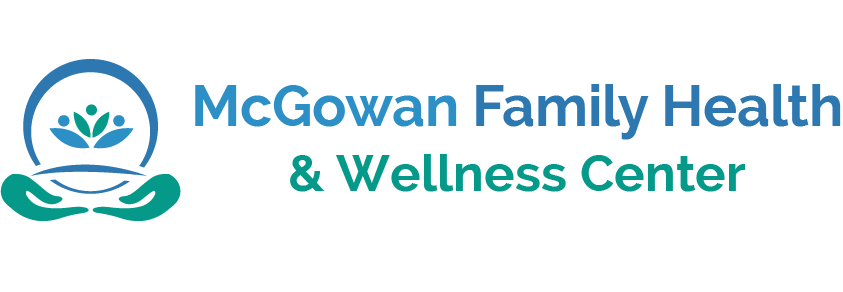Hypertension (high blood pressure) is a frequent disorder in which the blood’s long-term force against the artery walls is high enough to produce health problems such as heart disease. How to recognize hypertension signs and symptoms?

The amount of blood your heart pumps, as well as the amount of resistance to blood flow in your arteries, influence your blood pressure. The greater your blood pressure, the more blood your heart pumps and the narrower your arteries become. The measurement of blood pressure is in millimeters of mercury (mm Hg).
Number one (systolic pressure). When your heart beats, the first, or upper, number measures the pressure in your arteries. Number at the bottom (diastolic pressure). The second, or lower, number refers to the pressure in your arteries between each heartbeat. Macgowan will guide for family medicine.
High blood pressure can be present for years without causing any symptoms. High blood pressure that is uncontrolled raises your risk of significant health problems such as heart attack and stroke. High blood pressure, fortunately, is easily detectable. You can work with your doctor to control your blood pressure after you discover you have it.
Symptoms
- Even when blood pressure readings reach dangerously high levels, most persons with high blood pressure show no signs or symptoms.
- Headaches, shortness of breath, and nosebleeds are common signs and symptoms of high blood pressure, but they aren’t specific and usually don’t appear until the condition has progressed to a severe or life-threatening stage.
When Should You See a Doctor
- Your blood pressure will almost certainly be taken as part of a typical doctor’s visit. Starting at the age of 18, ask your doctor for a blood pressure reading at least every two years. Ask your doctor for a blood pressure reading every year if you’re 40 or older, or if you’re 18 to 39 and have a high risk of high blood pressure.
- To ascertain if there is a difference, blood pressure should be taken in both arms. It’s critical to utilise an arm cuff that’s the right size.
- If you’ve been diagnosed with high blood pressure or have other cardiovascular risk factors, your doctor will likely urge more regular readings. Blood pressure is usually checked in children aged 3 and up as part of their annual examinations.
- If you don’t see your doctor on a regular basis, you may be able to get a free blood pressure screening at a health resource fair or other community sites. Some establishments also have equipment that will measure your blood pressure for free.
- Public blood pressure machines, such as those found at pharmacies, can be useful in determining your blood pressure, but they do have certain limitations. The accuracy of these machines is determined by a number of parameters, including cuff size and machine usage. Inquire with your doctor about the use of public blood pressure equipment.
Causes
High blood pressure can be divided into two categories:
- Hypertension that is primary (essential). There is no known cause of elevated blood pressure in most persons. Primary (essential) hypertension is a type of high blood pressure that develops gradually over several years.
- Hypertension that develops as a result of something else. A underlying ailment can produce high blood pressure in some persons. Secondary hypertension is a type of high blood pressure that appears suddenly and causes higher blood pressure than initial hypertension.
Secondary hypertension can be caused by a variety of illnesses and drugs, including:
- Obstructive sleep apnea (OSA) is a type of sleep apnea
- Kidney disease is a condition that affects the kidneys
- Tumors of the adrenal gland
- Thyroid issues
- Certain blood vessel malformations (congenital) are present at birth.
- Birth control pills, cold treatments, decongestants, over-the-counter pain relievers, and some prescription pharmaceuticals are examples of medications.
- Cocaine and amphetamines are examples of illegal substances.
There are numerous risk factors for high blood pressure, including:
Age: As you become older, your chances of developing high blood pressure increase. Men are more likely than women to have high blood pressure until they reach the age of 64. After the age of 65, women are more prone to have high blood pressure.
Race: High blood pressure is more common among African-Americans than it is in whites, and it often develops at a younger age. Serious consequences like stroke, heart attack, and kidney failure are also more likely in African-Americans.
History of the family: High blood pressure is a condition that tends to run in families.
Obesity is being overweight: The more blood you need to deliver oxygen and nourishment to your tissues, the more you weigh. The pressure on your artery walls rises as the volume of blood flow via your blood vessels increases.
Being inactive physically: Inactive people have a greater heart rate than active people. The harder your heart has to work with each contraction, and the greater the force on your arteries, the higher your heart rate is. Being overweight is also linked to a lack of physical activity.
Tobacco use: Smoking or chewing tobacco not only momentarily raises your blood pressure, but the chemicals in tobacco can also damage the lining of your artery walls. This can constrict your arteries and put you at risk for heart disease. Secondhand smoke can potentially raise your risk of heart disease.
Salt: You are consuming too much salt (sodium) in your diet. If you eat too much sodium, your body will retain fluid, which will raise your blood pressure.
Potassium: Potassium deficiency in the diet. Potassium helps to keep the sodium levels in your cells in check. A healthy potassium balance is essential for heart health. Sodium can build up in your blood if you don’t get enough potassium in your food or if you lose too much potassium due to dehydration or other health problems.
Alcohol: Overindulging in alcoholic beverages. Heavy drinking might harm your heart over time. Women who drink more than one drink per day and men who drink more than two drinks per day may have an increase in blood pressure. Consume alcohol in moderation if you choose to do so. That is up to one drink per day for women and two drinks per day for males for healthy individuals. 12 ounces of beer, 5 ounces of wine, or 1.5 ounces of 80-proof liquor equals one drink.
Stress: High stress levels might cause a temporary rise in blood pressure. Stress-related behaviours such as overeating, smoking, or drinking alcohol can cause blood pressure to rise even higher.
Certain chronic illnesses: Kidney illness, diabetes, and sleep apnea are among chronic disorders that might increase your risk of high blood pressure.
Pregnancy: Pregnancy can sometimes contribute to high blood pressure.
Although adults are more likely to have high blood pressure, children may also be at risk. High blood pressure can be caused by problems with the kidneys or the heart in some children. However, bad lifestyle habits, such as an unhealthy diet and lack of exercise, are contributing to high blood pressure in an increasing number of children.
Complications
High blood pressure puts too much pressure on your artery walls, which can harm your blood vessels and organs. The more your blood pressure rises and the longer it remains uncontrolled, the more harm it does.
Uncontrolled high blood pressure can cause a variety of problems, including:
- A heart attack or a stroke are both possibilities. Atherosclerosis (hardening and thickening of the arteries) caused by high blood pressure can lead to a heart attack, stroke, or other issues.
- Aneurysm. Aneurysms arise when blood arteries weaken and bulge as a result of high blood pressure. An aneurysm can be life-threatening if it ruptures.
- Heart failure is a serious condition. The heart needs to work harder to pump blood against the increasing pressure in your veins. The walls of the heart’s pumping chamber thicken as a result of this (left ventricular hypertrophy). The swollen muscle may eventually struggle to pump enough blood to fulfil your body’s needs, resulting in heart failure.
- Kidney blood arteries have become weak and constricted. This can make it difficult for these organs to function appropriately.
- Blood vessels in the eyes that have thickened, constricted, or torn. It’s possible that you’ll lose your vision as a result of this.
- Metabolic syndrome is a condition in which the body’s metabolism is disrupt Increased waist circumference, elevated triglycerides, decreased high-density lipoprotein (HDL) cholesterol (the “good” cholesterol), high blood pressure, and high insulin levels are all symptoms of this syndrome. Diabetes, heart disease, and stroke are all more likely if you have these illnesses.
- Problems with memory or comprehension. High blood pressure that isn’t under control can impair your capacity to think, remember, and learn. People with high blood pressure are more likely to have memory or comprehension problems.
- Dementia. Blood flow to the brain can be restricted by narrowed or clogged arteries, resulting in dementia (vascular dementia). Vascular dementia can also be caused by a stroke that blocks blood supply to the brain.
Mcgowan Family Health and Wellness Centre is expert in family practice Flossmoor. Many people ask hypertension; how to lower blood pressure, so you can read more about it in another post. For assistance, you can call us anytime at (708) 480 9730.

